with azbil
SPECIAL
- NEW
Special Talk | Masayuki Adachi, President & COO, HORIBA, Ltd. × Kiyohiro Yamamoto Director, President, and CEO, Azbil Corporation

Providing value to resolve social issues while quickly responding to a rapidly changing business environment
Following the COVID-19 pandemic, which brought significant restrictions to people's lives, the environment surrounding companies is now at a major turning point, with digital transformation (DX) progressing rapidly. In such a situation, what should corporate management follow to guide them as they move forward? Masayuki Adachi, president & COO of HORIBA, Ltd., a Kyoto-based company that operates a global analytical and measuring equipment business, spoke with Kiyohiro Yamamoto, president and CEO of Azbil Corporation.
Providing comprehensive solutions to various sectors of society
—In these currently turbulent times, what kind of value are you planning to provide to your customers and society?
AdachiIn 1978, our founder, Masao Horiba, set “Omoshiro Okashiku” (Joy and Fun) as the company’s motto. It is our hope that employees will always approach their work with a sense of purpose, making their everyday life at the company, where they spend a significant amount of their time, something fun through their own efforts, while also valuing the spirit of taking on challenges without fearing change or failure. In addition, in January 2024, we established “Joy and Fun for All” as our group's shared vision. It expresses our desire to increase corporate value and achieve sustainable growth by spreading “Joy and Fun” not only to our own company, but also to every stakeholder including our customers and partner companies, and even to all life on Earth, through solutions created by our unique human capital*1 who will lead the next generation.
In MLMAP2028, our medium- to long-term management plan for the next five years, which was formulated in February 2024, we have reorganized our business fields, which had previously been divided into five segments, into three focus market fields: Energy & Environment, Bio & Healthcare, and Materials & Semiconductors. The aim is to organically combine our company's core technologies to create original “measuring technologies” for fields that will continue to be in demand regardless of the era, and to contribute to solving social issues.
For example, in order to achieve carbon neutrality, we have been pursuing high efficiency and low emissions in combustion and power generation with gas analysis technology for over half a century. In addition, we provide equipment to evaluate the efficiency of water electrolysis in the hydrogen production process and CO2 capture applications to meet the diverse needs of each region. We believe that our greatest value lies in using our technologies to provide comprehensive solutions to various sectors of society.
YamamotoFor Azbil, fiscal 2024 will be the final year of the medium-term management plan that we have been working on since fiscal 2021. Under this plan, the azbil Group aims to make contribution “in series” to a sustainable society through measurement and control technologies. We strive to provide distinctive solutions in each of our three growth areas, which are our strengths: new automation, environment and energy, and the life-cycle solutions business. Accordingly, various changes have been made, and we have seen great results in the development of new products and collaborations with other companies.
On the other hand, the progress of inflation and rising labor costs, which have been particularly noticeable in recent years, have revealed issues that need to be addressed, such as further strengthening profitability and improving operational efficiency, as well as business development aimed at resolving emerging social issues and further enhancing product appeal.
Taking these challenges into consideration, we have positioned fiscal 2024 as a year of “transformation for further growth” and will continue to actively invest in research and development, digital transformation, and human resources. At the same time, we are actively considering the content of our new medium-term management plan, set to start in fiscal 2025, based on the results of our transformation to date and the issues that have emerged.
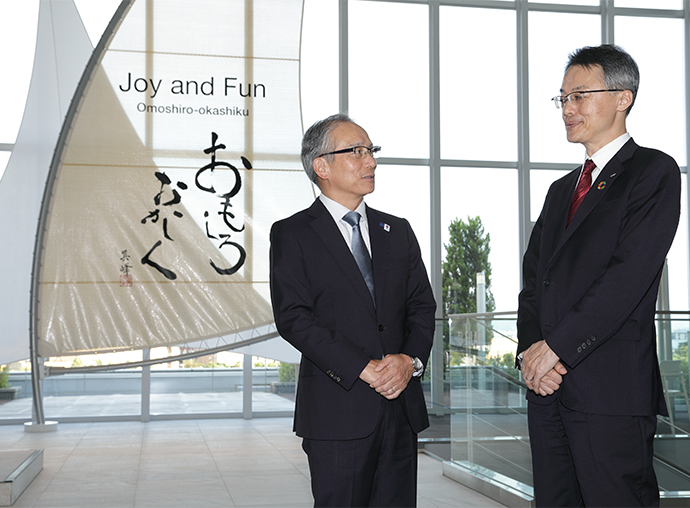
At the entrance to HORIBA BIWAKO E-HARBOR, HORIBA's research and development and production center.
The phrase “Omoshiro Okashiku,” written on the sail, was handwritten by the founder, Masao Horiba.
Corporate “collaboration” is essential for providing new social value
—Providing such value will no longer be possible for individual companies alone, and going forward it will become important for multiple companies to work together and collaborate in a way that utilizes each other's strengths.
AdachiI believe that collaboration is essential for companies today to provide social value. It is important to promote industry-to-industry collaboration between companies, as well as industry-academia collaboration and industry-government-academia collaboration on a global scale.
For example, in June 2021, we developed and released the measuring device “LC-Raman System*2” in collaboration with Shimadzu Corporation. This was made possible by combining Shimadzu's separation technology with our unique spectroscopic technology. This combination has significantly improved the accuracy of analysis and identification of the components in mixed samples, while also creating new value by making it possible to detect components that cannot be detected using LC detectors. In this way, there are increasing cases of companies that were once perceived as competitors now collaborating in a way that acknowledges and complements each other's technologies. Of course, we would like to explore the possibility of collaboration with your company.
Furthermore, Kyoto is home to many universities that are cultivating their own unique cultures. Many of these university research institutes are also our customers, and we have placed importance on industry-academia collaboration since our founding. In recent years, we signed a comprehensive partnership agreement with Kyoto University in 2023. We have named this “HONMAMON*3” Co-Creation Research Program” and are currently conducting joint co-creation research. This involves advancing genuine basic research, which aims to lead to the creation of next-generation technologies through an open call for proposals from within the university.
YamamotoOne of our specific initiatives is collaboration in the field of building automation (BA). When constructing a building, hundreds of thousands of products from thousands of companies are used in its facilities. By collaborating with many companies that not only provide products but also construct buildings and add various functions to them, we are able to create comfortable and safe living spaces. As this is an area in which buildings and facilities cannot be completed without collaboration between the construction industry and various manufacturers, collaboration with outside parties has become the norm.
In recent years, we have been promoting green transformation (GX)*4 in our “environment and energy” business. We also support the Ministry of Economy, Trade and Industry's “GX League Basic Concept,” and with the promotion of GX in mind, we are strengthening our collaboration with government and academia with an eye toward achieving carbon neutrality by 2050 and social transformation. Within the company, we are also gradually setting up departments to promote GX.
From a global perspective, in May 2023, we signed a memorandum of understanding with the Indian Institute of Technology, Roorkee, one of India's leading technical educational institutions, to jointly research innovative digital solutions. Through this collaboration, we will jointly conduct research into groundbreaking technologies and provide the school's students with the opportunity to learn in a global work environment, thereby supporting both technological research and education.
A variety of our products have already been adopted in your factories and buildings. In that sense, we believe that the groundwork is now in place for us to further advance collaboration in areas such as promotion of energy conservation.
Technology transfer cannot be achieved by simply transforming tacit knowledge into explicit knowledge
—For both companies, where technology is the core of their competitiveness, the transfer of technology from experienced workers to younger employees is also an important issue.
AdachiOur company’s founder, Masao Horiba, was committed to “HONMAMON” technology, which means heartfelt craftsmanship. Its value remains unchanged over time. At our company, we do not simply protect and pass on our core technologies. Instead, we call this practice of passing on the know-how and knowledge accumulated by our engineers to the next generation “SENGU” (the transfer of technology), and have established it as a part of our corporate culture.
A common approach to skill transfer is said to be to “make visible” the tacit knowledge of experts, turning it into explicit knowledge. But in reality, we believe it's not that simple. At our bases around the world, we provide opportunities for young employees to learn the techniques of veterans and master core technologies by making things from scratch. Through these opportunities, we believe that veterans can pass on the know-how they have acquired through experience to the younger generation, and at the same time, by adding the flexible imagination of the younger generation, we can create new technologies.
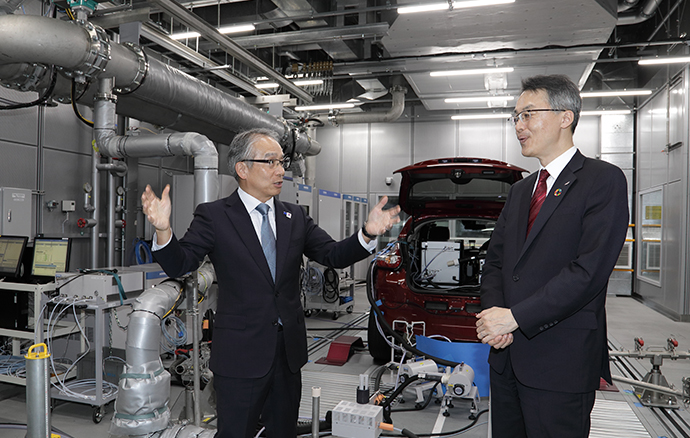
“E-LAB,” an automotive testing laboratory located within HORIBA BIWAKO E-HARBOR, allows visitors to see, use, and experience the effects of cutting-edge solutions.
Even without actually driving a car, various experiments can be carried out under conditions equivalent to driving.
YamamotoI see. We think the same way. Takehiko Yamaguchi, founder of the azbil Group, studied technology in Europe and the United States during Japan's period of industrial growth. He established Yamatake Shokai, the predecessor of today's Azbil Corporation, with the goal of using that technology to “free people from drudgery.” That spirit continues in the Group's current philosophy of “human-centered automation.”
It is the idea of balancing the input of energy and resources with the conservation of the global environment, based on the comfort and productivity of people. For example, there are always people working. A space where people feel safe and comfortable is an environment that allows for new, more creative ways of working. In other words, our core business involves developing technologies based on a “human-centered” approach, such as technology that controls the thermal environment of a space using “human sensitivity” as a sensor to create a comfortable environment using less energy, and technology that provides not only safety and peace of mind, but also more creative and free time for the people working on-site. As President Adachi says, the transfer of such technology cannot be achieved simply by transforming tacit knowledge into explicit knowledge. It is essential that people involved in technology gain experience through hands-on work, and we are also striving to build a system that will enable this.
The difference between humans and AI is the presence or absence of passion
—The need for human capital management is being loudly proclaimed. What efforts are you making in this regard?
YamamotoIn July 2019, the azbil Group announced the “azbil Group Health and Well-Being Declaration,” which aims to create a workplace where each individual can maximize their capabilities by promoting the creation of new ways of working and diversity. We believe that our efforts to “create value on-site and contribute to society” will lead to employee job satisfaction and well-being. This indicator is linked to the targets set by the “Essential Goals of azbil Group for SDGs,” which aim to increase the percentage of employees who feel satisfied with their work and experience a sense of personal growth to over 65% by 2030, and to double the level of women's participation and training opportunities compared to 2017 levels. Various challenges are being undertaken to achieve these goals.
In addition, in June 2020, amid the COVID-19 pandemic, we launched an initiative called “Let's Talk with the President,” which brings the president and employees together to discuss issues. To date, we have had dialogue with over 3,800 employees both in Japan and overseas. Furthermore, through the activities of the Azbil Diversity Network (ADN), which is being developed as part of our diversity promotion efforts, we are steadily moving forward with initiatives based on three perspectives: reforming the company's culture and attitudes, encouraging diverse human resources to take active roles, and promoting diverse work styles. We have received numerous suggestions from employees, many of which have been incorporated into actual measures.
AdachiSuch initiatives are important. The HORIBA Group is also working on initiatives focused on strengthening employee engagement. Our company is said to have the most parties in Japan. For example, the executives host birthday parties every month. Birthday parties, which are open to all employees whose birthdays fall within that month, are not only popular in Japan but also at Group companies overseas. In Japan, social committees that organize events play a central role in providing various opportunities for socializing, such as sports days and summer festivals. The summer beer garden hosted by new employees has also become an annual tradition. Both of these initiatives are aimed at revitalizing communication within the company, and we strive to create spaces where employees can talk freely with executives and managers. We believe that doing so will help develop our employees and enable them to perform to the best of their potential.
AI is currently gaining significant attention for its business applications, but when it comes to the difference in value between humans and AI, I personally think it lies in the presence or absence of passion. Will we be entrusted with something we really want to do, and will they be able to carry out what we entrust them to do? Or how will we align and resolve differing opinions? It is important for employees to communicate in this way so that they can clearly express and share their passion.
The HORIBA Group celebrated its 70th anniversary in 2023. Since then, we have been holding repeated discussions about the future, including what kind of company we want to be in the run-up to our 100th anniversary 30 years from now, and what kind of human capital the “HORIBARIAN” (the nickname for employees working at HORIBA) should be. The group's shared vision introduced at the beginning, “Joy and Fun for All,” was also born out of these discussions. I am convinced that deepening our understanding of this shared vision and becoming the embodiment of our company motto, “Joy and Fun,” will be the driving force behind our company's growth. We want to continue to foster a corporate culture in which each and every HORIBARIAN pursues what they find interesting.
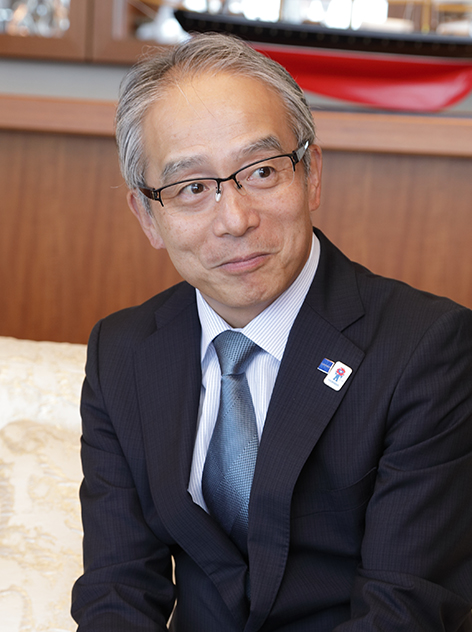
Continuing to cultivate a corporate culture in which the spirit of taking on challenges without fear of change or failure is valued
President & COO
HORIBA, Ltd.
Dr. Masayuki Adachi
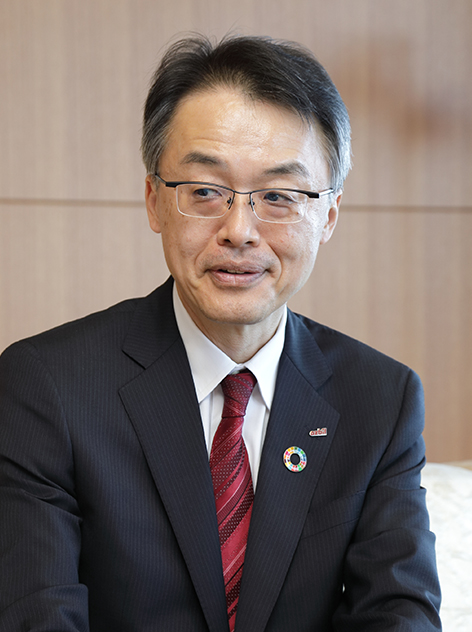
Contribution “in series” to a sustainable society leads to job satisfaction and well-being
Director
President and CEO
Azbil Corporation
Kiyohiro Yamamoto
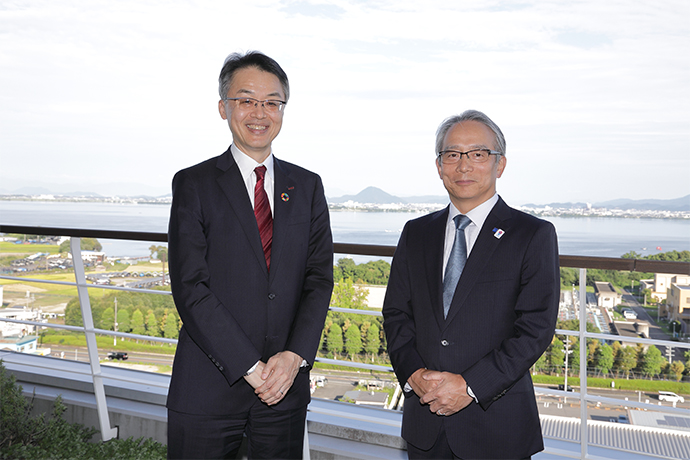
HORIBA BIWAKO E-HARBOR, designed to resemble a ship, offers a panoramic view of Lake Biwa.
- *1:Human capital
At HORIBA, employees are considered to be the most valuable assets and are referred to as “human capital.” - *2:LC-Raman system
A composite system that combines liquid chromatography (LC) manufactured by Shimadzu Corporation, Raman manufactured by HORIBA, Ltd., and the dedicated software “LiChRa.“
Product site: LC-Raman System LC-Raman System Dedicated Software LiChRa™ - HORIBA - *3:“HONMAMON”
A word meaning “authentic” in the Kansai dialect, one of the dialects spoken in the Kansai region of Japan. Masao Horiba, the founder of HORIBA, believed that “authentic” technology, which means heartfelt craftsmanship retains its value over time, touches people's hearts, inspires them, and brings unwavering trust, and he was committed to developing genuine technology.
At HORIBA, they understand the meaning of HONMAMON to be “unique value that is born from the wholehearted pursuit of making things better,” and we cherish the phrase as it carries on the aspirations of our founder. - *4:Green transformation
Green transformation involves recognizing the achievement of carbon neutrality (reducing greenhouse gas emissions to net zero) as an opportunity for economic growth and reforming the socio-economic system to reduce emissions and improve industrial competitiveness.
 Related information
Related information
-

Medium-term Plan
-

azbil Group Health and Well-being Declaration
-

Essential Goals of azbil Group for SDGs
-

Employee Relations
-

Using GX to Help Achieve Carbon Neutrality
-

Sustainable Development Goals
-

Green Transformation (GX)
-

Azbil and the Indian Institute of Technology Roorkee Sign MoU for Research Collaboration on Innovative Digital Solutions
